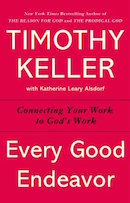Watch Out for Empty Words, Part 2
Daily Reflection / Produced by The High Calling
Let no one deceive you with empty words, for because of such things God’s wrath comes on those who are disobedient.
Ephesians 5:6
In yesterday's reflection, we saw that "empty words" are those lacking truth. Such words promise life but lead to death. They appear to be wise but lead us in the path of foolishness.
The Apostle Paul was particularly concerned about "empty words" that might deceive us concerning the best ways to live when it comes to sexuality and money. Indeed, we should be wary about the flood of such empty words in our own day. But the phrase "empty words" suggests another application, one that Paul would not have considered.
I'm thinking of the way that modern technology fosters "empty-wordiness." Twenty-four hour news shows require words when the meaningful ones have run out. Countless cable channels fill our televisions—and perhaps our living rooms and our minds—with silly and senseless words. Then there's the Internet. This technological wonder fosters a flood of empty words that's like nothing before in human history. Email invites quick rather than thoughtful responses. Texting accelerates our progress towards verbal emptiness. Did you know that Americans fill Twitter with 400 million tweets each day, and that all of these are being stored in the Library of Congress? Think there might be a few empty words there?
Of course, our technology can also capture and distribute "non-empty words," words that are full of truth, wisdom, and life. At least I hope this is so, given that I write the words of these Daily Reflections to be distributed through email and at The High Calling website. You and I are not compelled to consume the empty words offered to us on the Internet. And we certainly don't have to add to them. But, avoiding empty words requires us to be aware, to consider, and to make conscious choices about what we consume and what we contribute.
Perhaps we need to reflect deeply on the implications for us of Paul's exhortation in Ephesians 5:6, "Let no one deceive you with empty words." And perhaps we need to hear once again the ancient wisdom of Preacher, who said, "Do not be quick with your mouth, do not be hasty in your heart to utter anything before God. God is in heaven and you are on earth, so let your words be few" (Eccles. 5:2).
QUESTIONS FOR FURTHER REFLECTION: When are you tempted to consume empty words? Why? When do you add to the flood of empty words? Why? Are all such empty words harmful? Or is it okay to play around with words sometimes? How can we be people who take in and who produce words full of truth, wisdom, and love?
PRAYER: Gracious God, help me to avoid empty words that would impoverish my soul and my relationships. Help me to use words that enrich my inner life and bless others. Most of all, may my diet of words and my production of words honor you always. Amen.
______________________________
Reclaiming Sabbath Keeping
Sabbath is more than a day off. It is a turning of the entire being toward God—a time set apart to contemplate life and work and praise the Creator for it all. The Christian observance of Sabbath is set apart by its lack of rules—there is no strict way to keep Sabbath in Christianity. It’s not a “must” of our faith. And yet, to ignore this fourth commandment is to miss some of God's richest blessings for his people. Join us for The High Calling series on Reclaiming Sabbath Keeping as we explore what the Christian Sabbath might look like and glimpse some benefits and challenges of Sabbath-keeping in today's productivity-driven culture.
Image above by Armando Maynez. Used with Permission. Via Flickr.






